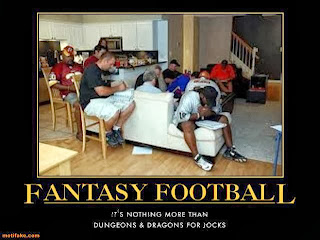Good morning class, welcome to Tabletop Gaming 1003. The "1" designates that you do not
know anything about the subject and the "3" designates how many hours
of credit this class is worth. For the
life of me, I never knew what the middle numbers were used for other than
complicating my life when trying to make sure I had the easy teacher.
How about
we start today with understanding what tabletop gaming really is. It is not Scrabble, Checkers or
Tic-Tac-Toe. It might be Monopoly, Sorry
or Apples-to-Apples, but let's be honest, that crap is for strict Christian
family night at home or the church picnic.
Family's who's kids are one high school graduation away from being shown
what the real world is (note: there is a time and place for everything and it's
called college, if you didn't do stupid shit in college, you missed out). Now quick, you can jump over to Wikipedia and read some douche
bag's idea of what constitutes tabletop gaming...OR...we can toss your ass into
the fire and see if it burns.
Tabletop gaming comes in five basic styles: Strategy, Chance,
Miniature, Card and Role-Playing.
 Strategy (sometimes
called European) is based on planning your moves, anticipating what your
opponent(s) will do and reacting to minor changes in the gaming
environment. Lords
of Waterdeep and Carcassonne
are decent representations of this style.
Strategy (sometimes
called European) is based on planning your moves, anticipating what your
opponent(s) will do and reacting to minor changes in the gaming
environment. Lords
of Waterdeep and Carcassonne
are decent representations of this style. Chance
(also called American) is based on random events that can radically change the
game, game environment or game progression with a roll of the die or a pull of
the card. Cosmic
Encounter is dice-less, but is so random that the game can turn on one card
being pulled from the deck, while SmallWorld may or may not
require dice depending on your decisions.
Chance
(also called American) is based on random events that can radically change the
game, game environment or game progression with a roll of the die or a pull of
the card. Cosmic
Encounter is dice-less, but is so random that the game can turn on one card
being pulled from the deck, while SmallWorld may or may not
require dice depending on your decisions. Miniature
games require boards, miniature pieces and often lots of money to invest in the
pieces and time to invest in their customizations. Warhammer
(and its 40K version) and Leviathans
represent miniature gaming very well.
Miniature
games require boards, miniature pieces and often lots of money to invest in the
pieces and time to invest in their customizations. Warhammer
(and its 40K version) and Leviathans
represent miniature gaming very well. Card games
generally involve either pre-building a deck before the game starts - Magic: The Gathering or as
the game progresses - Ascension.
Card games
generally involve either pre-building a deck before the game starts - Magic: The Gathering or as
the game progresses - Ascension.
Finally, we
get to Role-Playing games for the tabletop.
Traditionally, this has meant Dungeons
and Dragons or any of its numerous derivatives. However, Wizards
of the Coast got the idea a few years ago to introduce a true board game
version and they did it quite well with Castle
Ravenloft, Wrath
of Ashardalon and Legend
of Drizzt. However, others are there
as well, Game
of Thrones or Descent
fill in quite nicely.
So, now you
have some idea of the plethora of games and game types available out
there. In the next installment, we look
into some of the digitized versions of these games.



.png)




